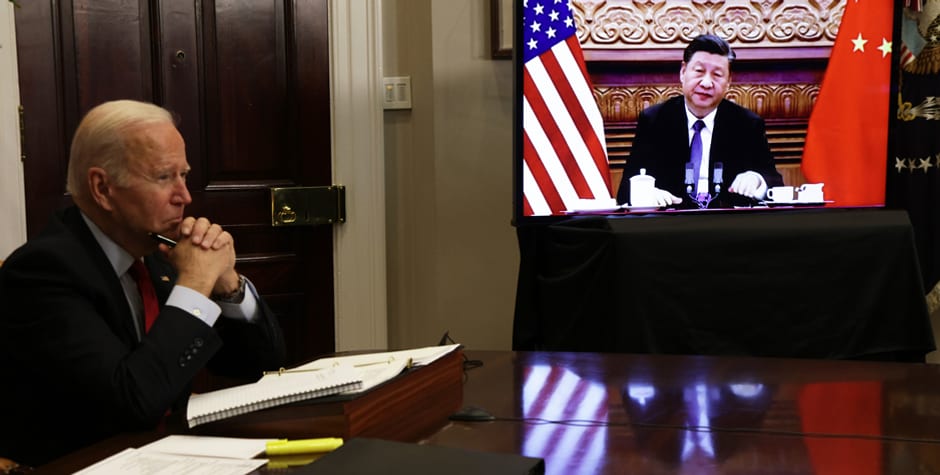How Should the U.S. Respond to the Multi-faceted Threat From China?
The world is more and more a complicated and, at times, dangerous place. Anytime U.S. leadership is perceived as vacillating or weak, our adversaries seek to take advantage of America. The United States has been distracted for the last 20 years by fighting terrorism in Afghanistan and Iraq—a necessary fight, but other threats arose in that time.
While the Biden Administration is preoccupied with the Left’s demands for more spending and more socialistic government control in the Build Back Better bill—we face serious threats to national security. And the chief responsibility of the federal government articulated in the Constitution and statutory law is national defense. That should always be the number one priority of any presidential administration.
Russia is again amassing troops along the Ukrainian border. An invasion is likely. Iran is very close to actually acquiring a nuclear weapon. Afghanistan is again controlled by the Taliban and is once again a safe haven for al-Qaeda and ISIS. China is expanding its military power, nuclear arsenal, and intelligence capabilities. China continues to systematically violate Hong Kong’s autonomy. It appears likely that after China hosts the Winter Olympics in February, they will invade Taiwan. These global threats are exacerbated by President Biden’s low poll numbers in the United States and the international perception that he is a weak leader.
President Biden just held his virtual meeting with Chinese President Xi. All indications are the meeting was weak and inconsequential. The White House had indicated that Biden would not “hold back” and would take a firm and candid stance with Xi. It seems the opposite happened. For example, President Biden never pressed Xi on the COVID pandemic, China’s involvement in its development, and its unwillingness to cooperate with a scientific investigation of the health phenomenon that has killed millions of people. On the other hand, President Xi did take a very firm stand: He warned Biden that any U.S. involvement with Taiwan was playing with fire and that the U.S. would get burned.
China continues its abuse of human rights and its genocide of the Muslim Uyghurs in China. China continues to dominate world commerce with products produced by slave labor. Its intellectual property theft and cyber crimes go unchecked. China continues to violate Taiwanese territory in that nation’s waters and airspace. China is continuing its militarization of the South China Sea and claiming land in violation of international law.
The Pentagon is voicing concern over China’s military advances. General John Hyten, the retiring Vice Chairman of the Joint Chiefs of Staff, said, “The pace at which China is moving is stunning.” China recently tested a hyper-sonic missile capable of carrying a nuclear warhead. This missile would literally orbit the earth, reenter the atmosphere above a target, and be invincible to U.S. defensive measures. General Mark Milley, the Chairman of the Joint Chiefs of Staff, said the missile is just one of several concerns: “The Chinese military capabilities are much greater than that. They’re expanding rapidly in cyberspace and in traditional domains of land, sea, and air.” China is expanding its nuclear force, with 250 silos under construction for its intercontinental ballistic missiles (ICBMs). At the current pace, General Hyten stated that Beijing “will surpass Russia and the United States” in overall military power. For now, the United States possesses the most powerful military in the world.
In a striking example of losing focus, Pentagon spokesman John Kirby, when asked which threat was greater, climate change or China, essentially equated the two. It is foolish to equate climate change with the imminent and existential threat from China, an armed adversary with the world’s second largest economy. Yet, National Security Advisor Jake Sullivan stated, the U.S. is not seeking a new Cold War with China, but rather a peaceful coexistence. “The goal here is not containment; it’s not a new Cold War.” We do not wish to contain China? Why don’t we give them written permission to invade Taiwan and continue their military buildup in the South China Sea?
The price of freedom is eternal vigilance. These words are attributed to Thomas Jefferson. It is as true today as it was at the founding of our country. Focus and resolve are needed more than ever by our nation’s leaders. We must seek peace—through strength. China possesses the political will to be aggressive. We must match that will and that aggressiveness in defense of freedom.
Support the work of the ACLJ as we continue to bring you expert analysis on the issues that matter most.

